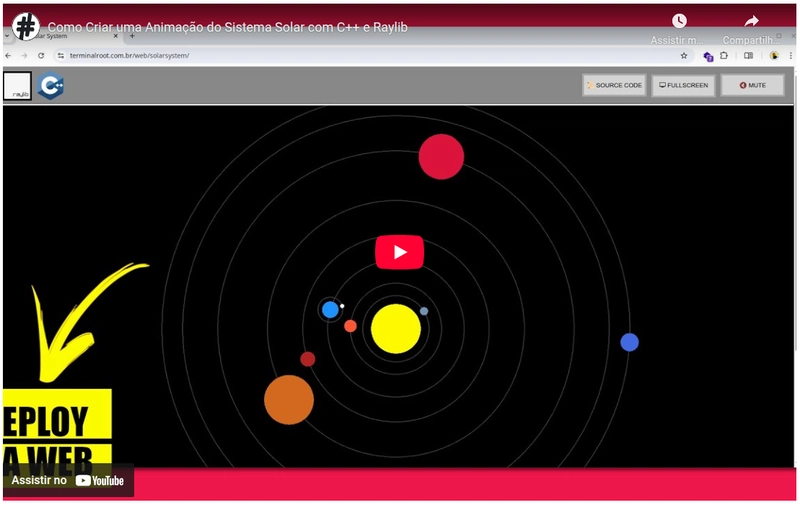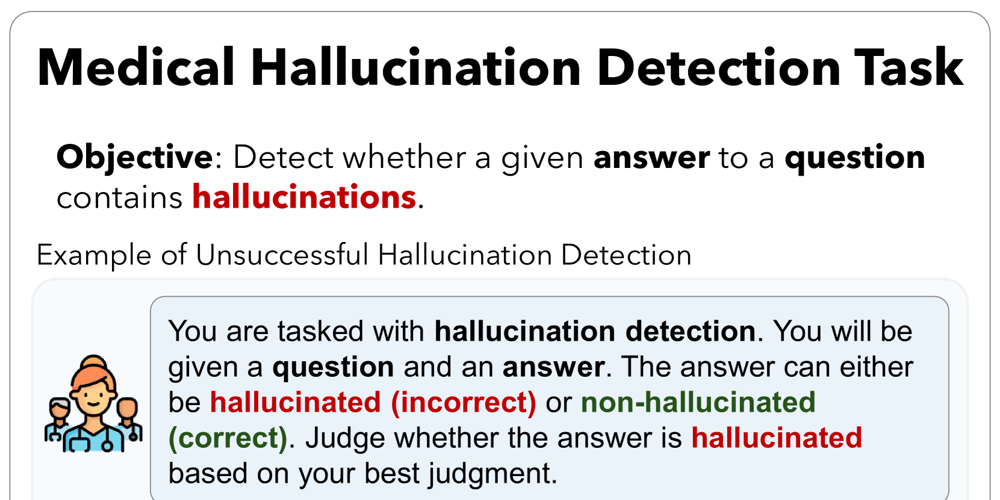How to Create a Solar System Animation with C++ and Raylib
With DEPLOY ON THE WEB! In this video we made an animation with C++ and Raylib similar to this one that we showed a while ago. At the end we made the DEPLOY on the WEB. Watch the Video Codes created in the video solarsystem.hpp #pragma once #include "raylib.h" #include #include #include class SolarSystem { const float sun_size = 60.f; Vector2 window, center; std::vector planet_radius, planet_sizes, planet_velocities, planet_angle; std::vector colors; const float moon_size = 5, moon_radius = 30, moon_velocity = 10; float moon_angle; int earth_pos; bool fullscreen; public: SolarSystem(); void run(); }; solarsystem.cpp #include "solarsystem.hpp" SolarSystem::SolarSystem(){ window = {1920, 1080}; InitWindow(window.x, window.y, "Solar System"); SetTargetFPS(60); center = {GetScreenWidth() / 2.f, GetScreenHeight() / 2.f}; planet_radius = {80, 110, 165, 225, 310, 430, 515, 565}; planet_velocities = {1.607f, 1.174f, 1.f, 0.802f, 0.434f, 0.323f, 0.228f, 0.182f}; planet_sizes = {10, 15, 20, 18, 60, 55, 25, 22}; colors = { {115, 147, 179, 255}, {255, 87, 51, 255}, {30, 144, 255, 255}, {178, 34, 34, 255}, {210, 105, 30, 255}, {220, 20, 60, 255}, {72, 209, 204, 255}, {65, 105, 225, 255} }; planet_angle.assign(8, 0); moon_angle = {0}; for(size_t i = 0; i < planet_sizes.size();++i){ if(planet_sizes[i] == 20){ earth_pos = i; } } fullscreen = {false}; } void SolarSystem::run(){ while (!WindowShouldClose()){ if(IsKeyPressed(KEY_F11)){ fullscreen = !fullscreen; if(fullscreen){ int monitor = GetCurrentMonitor(); SetWindowSize(GetMonitorWidth(monitor), GetMonitorHeight(monitor)); ToggleFullscreen(); }else{ ToggleFullscreen(); SetWindowSize(window.x, window.y); } } for(size_t i = 0; i < planet_radius.size(); ++i){ planet_angle[i] += planet_velocities[i] * 0.02f; } moon_angle += moon_velocity * 0.009f; BeginDrawing(); ClearBackground(BLACK); DrawCircleV(center, sun_size, YELLOW); for(size_t i = 0; i < planet_radius.size(); ++i){ DrawRing(center, planet_radius[i] - 1, planet_radius[i] + 1, 0, 360, 100, Color{60, 60, 60, 255}); Vector2 planet_pos = { center.x + std::cos(planet_angle[i]) * planet_radius[i], center.y + std::sin(planet_angle[i]) * planet_radius[i] }; DrawCircleV(planet_pos, planet_sizes[i], colors[i]); if((int)i == earth_pos){ DrawRing(planet_pos, moon_radius - 1, moon_radius + 1, 0, 360, 100, Color{60, 60, 60, 255}); Vector2 moon_pos = { planet_pos.x + std::cos(moon_angle) * moon_radius, planet_pos.y + std::sin(moon_angle) * moon_radius, }; DrawCircleV(moon_pos, moon_size, WHITE); } } EndDrawing(); } CloseWindow(); } main.cpp #include "solarsystem.hpp" int main(){ auto obj = std::make_unique(); obj->run(); return 0; } build.ter auto flags = "-g -Wall -Werror -Wpedantic -fsanitize=address" flags = "-O3 -ffast-math" auto build = "g++ " + flags + " *.cpp -lraylib -lGL -lm -lpthread -ldl -lrt -lX11" output(build) exec(build) exec("./a.out >/dev/null")

With DEPLOY ON THE WEB!
In this video we made an animation with C++ and Raylib similar to this one that we showed a while ago.
At the end we made the DEPLOY on the WEB.
Watch the Video
Codes created in the video
solarsystem.hpp
#pragma once
#include "raylib.h"
#include
#include
#include
class SolarSystem {
const float sun_size = 60.f;
Vector2 window, center;
std::vector planet_radius, planet_sizes,
planet_velocities, planet_angle;
std::vector colors;
const float moon_size = 5, moon_radius = 30,
moon_velocity = 10;
float moon_angle;
int earth_pos;
bool fullscreen;
public:
SolarSystem();
void run();
};
solarsystem.cpp
#include "solarsystem.hpp"
SolarSystem::SolarSystem(){
window = {1920, 1080};
InitWindow(window.x, window.y, "Solar System");
SetTargetFPS(60);
center = {GetScreenWidth() / 2.f, GetScreenHeight() / 2.f};
planet_radius = {80, 110, 165, 225, 310, 430, 515, 565};
planet_velocities = {1.607f, 1.174f, 1.f, 0.802f, 0.434f, 0.323f, 0.228f, 0.182f};
planet_sizes = {10, 15, 20, 18, 60, 55, 25, 22};
colors = {
{115, 147, 179, 255},
{255, 87, 51, 255},
{30, 144, 255, 255},
{178, 34, 34, 255},
{210, 105, 30, 255},
{220, 20, 60, 255},
{72, 209, 204, 255},
{65, 105, 225, 255}
};
planet_angle.assign(8, 0);
moon_angle = {0};
for(size_t i = 0; i < planet_sizes.size();++i){
if(planet_sizes[i] == 20){
earth_pos = i;
}
}
fullscreen = {false};
}
void SolarSystem::run(){
while (!WindowShouldClose()){
if(IsKeyPressed(KEY_F11)){
fullscreen = !fullscreen;
if(fullscreen){
int monitor = GetCurrentMonitor();
SetWindowSize(GetMonitorWidth(monitor), GetMonitorHeight(monitor));
ToggleFullscreen();
}else{
ToggleFullscreen();
SetWindowSize(window.x, window.y);
}
}
for(size_t i = 0; i < planet_radius.size(); ++i){
planet_angle[i] += planet_velocities[i] * 0.02f;
}
moon_angle += moon_velocity * 0.009f;
BeginDrawing();
ClearBackground(BLACK);
DrawCircleV(center, sun_size, YELLOW);
for(size_t i = 0; i < planet_radius.size(); ++i){
DrawRing(center, planet_radius[i] - 1, planet_radius[i] + 1, 0, 360, 100, Color{60, 60, 60, 255});
Vector2 planet_pos = {
center.x + std::cos(planet_angle[i]) * planet_radius[i],
center.y + std::sin(planet_angle[i]) * planet_radius[i]
};
DrawCircleV(planet_pos, planet_sizes[i], colors[i]);
if((int)i == earth_pos){
DrawRing(planet_pos, moon_radius - 1, moon_radius + 1, 0, 360, 100, Color{60, 60, 60, 255});
Vector2 moon_pos = {
planet_pos.x + std::cos(moon_angle) * moon_radius,
planet_pos.y + std::sin(moon_angle) * moon_radius,
};
DrawCircleV(moon_pos, moon_size, WHITE);
}
}
EndDrawing();
}
CloseWindow();
}
main.cpp
#include "solarsystem.hpp"
int main(){
auto obj = std::make_unique();
obj->run();
return 0;
}
build.ter
auto flags = "-g -Wall -Werror -Wpedantic -fsanitize=address"
flags = "-O3 -ffast-math"
auto build = "g++ " + flags + " *.cpp -lraylib -lGL -lm -lpthread -ldl -lrt -lX11"
output(build)
exec(build)
exec("./a.out >/dev/null")









































































































































































![[The AI Show Episode 142]: ChatGPT’s New Image Generator, Studio Ghibli Craze and Backlash, Gemini 2.5, OpenAI Academy, 4o Updates, Vibe Marketing & xAI Acquires X](https://www.marketingaiinstitute.com/hubfs/ep%20142%20cover.png)



























































































































![[FREE EBOOKS] The Kubernetes Bible, The Ultimate Linux Shell Scripting Guide & Four More Best Selling Titles](https://www.javacodegeeks.com/wp-content/uploads/2012/12/jcg-logo.jpg)



![From drop-out to software architect with Jason Lengstorf [Podcast #167]](https://cdn.hashnode.com/res/hashnode/image/upload/v1743796461357/f3d19cd7-e6f5-4d7c-8bfc-eb974bc8da68.png?#)






































































































.png?#)




.jpg?#)
































_Christophe_Coat_Alamy.jpg?#)








































































































![Rapidus in Talks With Apple as It Accelerates Toward 2nm Chip Production [Report]](https://www.iclarified.com/images/news/96937/96937/96937-640.jpg)








































































































































